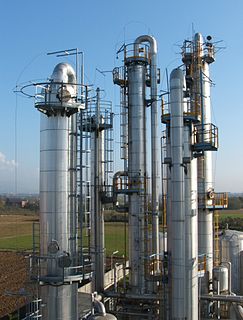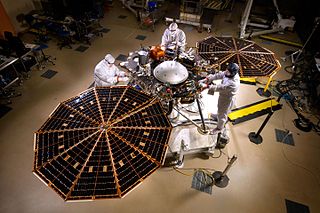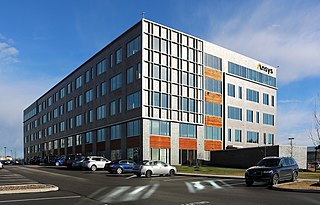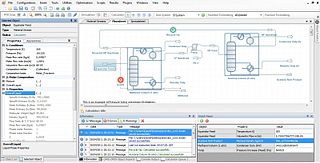
Chemical engineering is a branch of engineering which deals with the study of design and operation of chemical plants as well as methods of improving production. Chemical engineers develop economical commercial processes to convert raw material into useful products. Chemical engineering uses principles of chemistry, physics, mathematics, biology, and economics to efficiently use, produce, design, transport and transform energy and materials. The work of chemical engineers can range from the utilization of nanotechnology and nanomaterials in the laboratory to large-scale industrial processes that convert chemicals, raw materials, living cells, microorganisms, and energy into useful forms and products.

Engineering is the use of scientific principles to design and build machines, structures, and other items, including bridges, tunnels, roads, vehicles, and buildings. The discipline of engineering encompasses a broad range of more specialized fields of engineering, each with a more specific emphasis on particular areas of applied mathematics, applied science, and types of application. See glossary of engineering.

Systems engineering is an interdisciplinary field of engineering and engineering management that focuses on how to design, integrate, and manage complex systems over their life cycles. At its core, systems engineering utilizes systems thinking principles to organize this body of knowledge. The individual outcome of such efforts, an engineered system, can be defined as a combination of components that work in synergy to collectively perform a useful function.

A fractionating column or fractional column is an essential item used in the distillation of liquid mixtures to separate the mixture into its component parts, or fractions, based on the differences in volatilities. Fractionating columns are used in small scale laboratory distillations as well as large scale industrial distillations.
Process engineering is the understanding and application of the fundamental principles and laws of nature that allow us to transform raw material and energy into products that are useful to society, at an industrial level. By taking advantage of the driving forces of nature such as pressure, temperature and concentration gradients, as well as the law of conservation of mass, process engineers can develop methods to synthesize and purify large quantities of desired chemical products. Process engineering focuses on the design, operation, control, optimization and intensification of chemical, physical, and biological processes. Process engineering encompasses a vast range of industries, such as agriculture, automotive, biotechnical, chemical, food, material development, mining, nuclear, petrochemical, pharmaceutical, and software development. The application of systematic computer-based methods to process engineering is "process systems engineering".
A chemical reactor is an enclosed volume in which a chemical reaction takes place. In chemical engineering, it is generally understood to be a process vessel used to carry out a chemical reaction, which is one of the classic unit operations in chemical process analysis. The design of a chemical reactor deals with multiple aspects of chemical engineering. Chemical engineers design reactors to maximize net present value for the given reaction. Designers ensure that the reaction proceeds with the highest efficiency towards the desired output product, producing the highest yield of product while requiring the least amount of money to purchase and operate. Normal operating expenses include energy input, energy removal, raw material costs, labor, etc. Energy changes can come in the form of heating or cooling, pumping to increase pressure, frictional pressure loss or agitation.

Ansys, Inc. is an American company based in Canonsburg, Pennsylvania. It develops and markets multiphysics engineering simulation software for product design, testing and operation and offers its products and services to customers worldwide. Ansys was founded in 1970 by John Swanson. Swanson sold his interest in the company to venture capitalists in 1993. Ansys went public on NASDAQ in 1996. In the 2000s, Ansys made numerous acquisitions of other engineering design companies, acquiring additional technology for fluid dynamics, electronics design, and other physics analysis. Ansys became a component of the NASDAQ-100 index on December 23, 2019.
In chemical engineering, process design is the choice and sequencing of units for desired physical and/or chemical transformation of materials. Process design is central to chemical engineering, and it can be considered to be the summit of that field, bringing together all of the field's components.
Chemical engineering is a discipline that was developed out of those practicing "industrial chemistry" in the late 19th century. Before the Industrial Revolution, industrial chemicals and other consumer products such as soap were mainly produced through batch processing. Batch processing is labour-intensive and individuals mix predetermined amounts of ingredients in a vessel, heat, cool or pressurize the mixture for a predetermined length of time. The product may then be isolated, purified and tested to achieve a saleable product. Batch processes are still performed today on higher value products, such as pharmaceutical intermediates, speciality and formulated products such as perfumes and paints, or in food manufacture such as pure maple syrups, where a profit can still be made despite batch methods being slower and inefficient in terms of labour and equipment usage. Due to the application of Chemical Engineering techniques during manufacturing process development, larger volume chemicals are now produced through a continuous "assembly line" chemical processes. The Industrial Revolution was when a shift from batch to more continuous processing began to occur. Today commodity chemicals and petrochemicals are predominantly made using continuous manufacturing processes whereas speciality chemicals, fine chemicals and pharmaceuticals are made using batch processes.

In electrical engineering and mechanical engineering, a transient response is the response of a system to a change from an equilibrium or a steady state. The transient response is not necessarily tied to abrupt events but to any event that affects the equilibrium of the system. The impulse response and step response are transient responses to a specific input.

AVEVA Group plc is a British multinational information technology company headquartered in Cambridge, England. It is listed on the London Stock Exchange and is a constituent of the FTSE 100 Index. The company started as the Computer-Aided Design Centre.
The COCO Simulator is a free-of-charge, non-commercial, graphical, modular and CAPE-OPEN compliant, steady-state, sequential simulation process modeling environment. It was originally intended as a test environment for CAPE-OPEN modeling tools but now provides free chemical process simulation for students. It is an open flowsheet modeling environment allowing anyone to add new unit operations or thermodynamics packages.

The Institution of Chemical Engineers (IChemE) is a global professional engineering institution with over 35,000 members in over 100 countries worldwide. It was founded in 1922 and awarded a Royal Charter in 1957.
John Metcalfe Coulson was a British chemical engineering academic particularly known for co-writing a textbook on chemical engineering with Jack Richardson, which became an established series of texts now known as Coulson & Richardson's Chemical Engineering.
John Francis "Jack" Richardson OBE was a UK chemical engineering academic, notable for his research into multiphase flow and rheology, but best known for a series of textbooks.
Process flowsheeting is the use of computer aids to perform steady-state heat and mass balancing, sizing and costing calculations for a chemical process. It is an essential and core component of process design.

Process simulation is used for the design, development, analysis, and optimization of technical processes such as: chemical plants, chemical processes, environmental systems, power stations, complex manufacturing operations, biological processes, and similar technical functions.
ROMeoRigorous Online Modelling and Equation Based Optimization is an advanced online chemical process optimizer of SimSci, a brand of Aveva software It is mainly used by process engineers in the chemical, petroleum and natural gas industries.

The Department of Chemical Engineering, Imperial College London is the centre of teaching and research in chemical and process engineering at Imperial College London, occupying the Aeronautics and Chemical Engineering Extension (ACEX), Bone and Roderic Hill buildings, on the South Kensington campus. Formally inaugurated in 1912, the department has over 40 faculty members, 100 postdoctoral researchers, 200 PhD researchers, 80 taught postgraduates, and 500 undergraduates. The department ranks 7th on QS's 2018 world rankings.
Aspen Plus, Aspen HYSYS, ChemCad and MATLAB, PRO are the commonly used process simulators for modeling, simulation and optimization of a distillation process in the chemical industries. Distillation is the technique of preferential separation of the more volatile component (s) from the less volatile ones in a feed followed by condensation.The vapor produced is richer in the more volatile components(s). The distribution of the component in the two phase is governed by the vapour-liquid equilibrium relationship. In practice, distillation may be carried out by either two principal methods. The first method is based on the production of vapor boiling the liquid mixture to be separated and condensing the vapors without allowing any liquid to return to the still. There is no reflux. The second method is based on the return of part of the condensate to still under such conditions that this returning liquid is brought into intimate contact with the vapors on their way to condenser.









